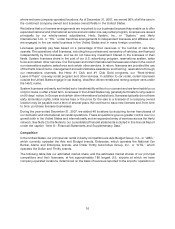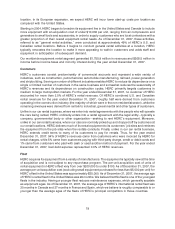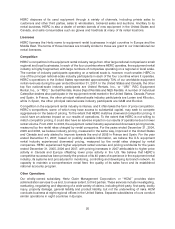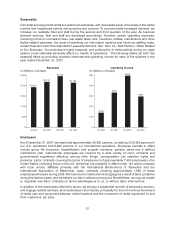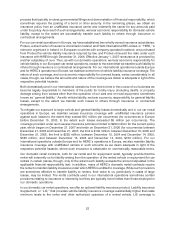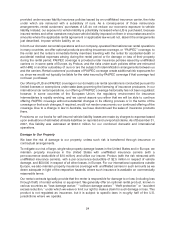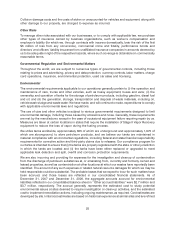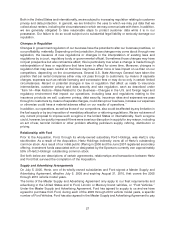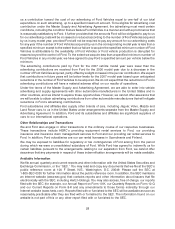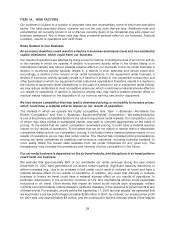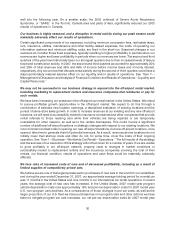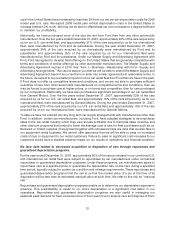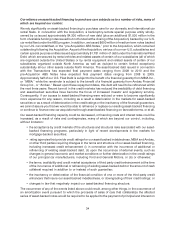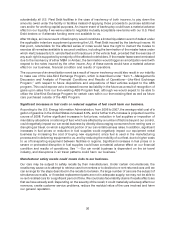Hertz 2007 Annual Report Download - page 46
Download and view the complete annual report
Please find page 46 of the 2007 Hertz annual report below. You can navigate through the pages in the report by either clicking on the pages listed below, or by using the keyword search tool below to find specific information within the annual report.over time on the basis of in-depth studies of the site. For many sites, the remediation costs and other
damages for which we ultimately may be responsible cannot be reasonably estimated because of
uncertainties with respect to factors such as our connection to the site, the nature of the contamination,
the involvement of other potentially responsible parties, the application of laws and other standards or
regulations, site conditions, and the nature and scope of investigations, studies, and remediation to be
undertaken (including the technologies to be required and the extent, duration, and success of
remediation).
With respect to cleanup expenditures for the discharge of petroleum substances at, or emanating from,
currently and formerly owned or leased properties, we have received reimbursement, in whole or in part,
from certain U.S. states that maintain underground storage tank petroleum cleanup reimbursement
funds. Such funds have been established to assist tank owners in the payment of cleanup costs
associated with releases from registered tanks. With respect to off-site U.S. locations at which our wastes
have reportedly been identified, we have been and continue to be required to contribute to cleanup
costs due to strict joint and several cleanup liability imposed by the federal Comprehensive
Environmental Response, Compensation, and Liability Act of 1980 and comparable state superfund
statutes.
Environmental legislation and regulations and related administrative policies have changed rapidly in
recent years, both in the United States and in other countries. There is a risk that governmental
environmental requirements, or enforcement thereof, may become more stringent in the future and that
we may be subject to legal proceedings brought by government agencies or private parties with respect
to environmental matters. In addition, with respect to cleanup of contamination, additional locations at
which wastes generated by us or substances used by us may have been released or disposed, and of
which we are currently unaware, may in the future become the subject of cleanup for which we may be
liable, in whole or part. Further, at airport-leased properties, we may be subject to environmental
requirements imposed by airports that are more restrictive than those obligations imposed by
environmental regulatory agencies. Accordingly, while we believe that we are in substantial compliance
with applicable requirements of environmental laws, we cannot offer assurance that our future
environmental liabilities will not be material to our consolidated financial position, results of operations or
cash flows.
Dealings with Renters
In the United States, car and equipment rental transactions are generally subject to Article 2A of the
Uniform Commercial Code, which governs ‘‘leases’’ of tangible personal property. Car rental is also
specifically regulated in more than half of the states of the United States. The subjects of state regulation
include the methods by which we advertise, quote and charge prices, the consequences of failing to
honor reservations, the terms on which we deal with vehicle loss or damage (including the protections
we provide to renters purchasing loss or damage waivers) and the terms and method of sale of the
optional insurance coverage that we offer. Some states (including California, New York, Nevada and
Illinois) regulate the price at which we may sell loss or damage waivers, and many state insurance
regulators have authority over the prices and terms of the optional insurance coverage we offer. See
‘‘—Risk Management’’ above for further discussion regarding the loss or damage waivers and optional
insurance coverages that we offer renters. Internationally, regulatory regimes vary greatly by jurisdiction,
but they do not generally prevent us from dealing with customers in a manner similar to that employed in
the United States.
26


